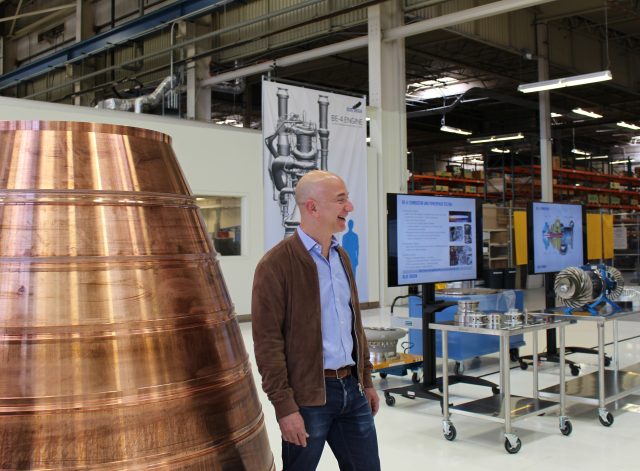
On Thursday night, just hours after John Glenn died, the Smithsonian Institution's held its 2016 American Ingenuity Awards banquet. This year the magazine honored Blue Origin founder Jeff Bezos, and as part of the ceremony former astronaut Mae Jemison read a rather extraordinary letter John Glenn had written less than two weeks before, on Nov. 28.
The letter commended Bezos for his achievements with Blue Origin, which mark critical steps toward developing a low-cost, reusable launch system. Blue Origin plans to offer suborbital tourism flights in 2018 aboard its New Shepard vehicle, and it has announced plans for ambitious orbital and deep space flights soon thereafter. Bezos wants to enable millions of people to live and work in space.
Glenn praised Bezos for a vision of space travel accessible not to just highly trained pilots and engineers, such as himself, but for all of humanity. "You understood that to realize that vision, we would have to be able to get to space more often and more inexpensively. So you and your Blue Origin team began designing rockets that can be reused over and over again," Glenn wrote.
With his letter, Glenn seems to clearly be coming down on the side of the "new guys" in an ongoing debate over the future of rocketry in the United States. Since the retirement of the space shuttle, NASA has returned to the large, expendable, and costly rockets of the Apollo era with its Space Launch System design. This all but ensures that only a handful of humans will ever go into deep space on NASA-built rockets. However Bezos, with Blue Origin, and Elon Musk, of SpaceX, have aggressively sought to develop much lower cost, reusable launch systems that can get more people and material into orbit.
Before the last year it was easy to dismiss the new guys as naive optimists or rich, rocket-boy pretenders. But then they started landing in West Texas and on boats, and Blue Origin started to successfully reuse its New Shepard rockets. There will undoubtedly be setbacks—if low-cost, reusable spaceflight were easy it would have been done before. But at this point it clearly is no longer theoretical, and Glenn recognized that.
The Mercury astronaut who became the first American to orbit Earth also wrote that he was "deeply touched" that Bezos had named his orbital rocket New Glenn. This massive, reusable, seven-engine rocket may be ready to fly by the end of this decade from Cape Canaveral, near where Glenn's own rocket took flight in 1962.
"As the original Glenn, I can tell you I see the day coming when people will board spacecraft the same way millions of us now board jetliners," Glenn wrote. "When that happens, it will be largely because of your epic achievements this year."
reader comments
13